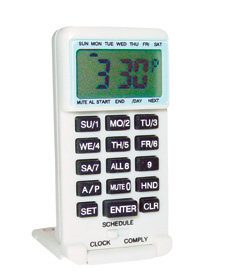As every ophthalmologist knows, patient compliance is key to effectively treating many conditions. In many cases, however, patients don't adhere to their dosing schedules, and their disease worsens. To help combat this, several companies have developed electronic devices to actively remind patients to take their medicine or allow their physicians to track their compliance. Here's a look at some of them.
• MEMS SmartCaps. The Medication Event Monitoring System caps fit on pill bottles and track compliance, but don't necessarily remind patients to comply. The cap displays how many times the bottle has been opened and how many hours since it was last opened, a kind of passive reminder. It also records how often it was opened, which can be uploaded to a pharmacist's or physician's PC with special software when the bottle is returned for a refill.
Though the SmartCaps are made for pill bottles, some researchers have modified the concept for liquid meds by putting a drop bottle or ointment tube in a larger bottle, which is then fitted with the SmartCap. In a study of pirenzepine ointment to prevent myopia in children, researchers used the "bottle-in-bottle" method, and average compliance was found to be about 65 percent (Bartlett JD, ARVO Abstract #1930, 2003).
At this point, the SmartCaps' main use appears to be in validating drugs' effectiveness in clinical studies, and researchers are their main customers currently. Gary Novack, PhD, of PharmaLogic Development in San Rafael, Calif., has used SmartCaps in studies. "It helps prove whether the agent you're studying worked or didn't," he says. "If a patient didn't take it, and you knew that, it would affect your conclusions."
• E-pill MedAlarm. This is a mini-computer that can store up to 24 alarm times for taking various medications. It's unique in that it may be the only dosage-alarm device that accommodates a holder for an eye-drop bottle. To
 |
| The MedAlarm allows patients to attach a drop bottle to the rear of the device. |
"But most people don't live life in three-hour intervals," says Mr. Solvell. "Maybe you'll instill a drop at 8:30 a.m. and then do it again at your next available break, which might be at lunch." He says for this type of dose schedule, there are discrete timers that allow patients to set each individual alarm time to suit their schedule. The MedAlarm costs $69.95. For information, call 1-800-549-0095.
• iVoice's talking bottle. This device is in the concept stage, with its maker only just submitting a patent application for it in February. The idea is to allow pharmacists to wirelessly send information about a drug's dosages and side effects directly to a pill bottle, which will then speak to the patient when he opens it.
"It could be used for any type of medication a drug company would want to provide information for," says Jerry Mahoney, iVoice's president.
These smart bottles' patent could be three years from approval, however. Once approved, iVoice plans to license drug companies to use the technology, rather than providing it to physicians or patients directly.



